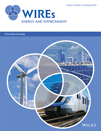
Wiley Interdisciplinary Reviews-Energy and Environment
Scope & Guideline
Exploring the nexus of energy and environmental science.
Introduction
Aims and Scopes
- Sustainable Energy Technologies:
The journal covers advancements in renewable energy technologies such as solar, wind, hydrogen, and bioenergy, emphasizing their potential for reducing greenhouse gas emissions. - Environmental Impact Assessments:
Research articles frequently focus on life cycle assessments and environmental impact studies, evaluating the sustainability of various energy sources and technologies. - Circular Economy and Resource Management:
The journal explores the integration of circular economy principles in energy systems, including waste management, recycling, and resource efficiency. - Interdisciplinary Approaches:
Emphasizing a multidisciplinary perspective, the journal encourages research that combines insights from engineering, economics, policy, and social sciences to address energy and environmental challenges. - Policy and Governance:
The journal discusses energy policies, governance structures, and regulatory frameworks that facilitate the transition to sustainable energy systems. - Technological Innovations:
Highlighting novel technological solutions, the journal publishes research on cutting-edge developments in energy storage, conversion, and efficiency.
Trending and Emerging
- Decarbonization Strategies:
There is an increasing focus on strategies for decarbonization across various sectors, including transportation, industry, and urban development, as the urgency for climate action intensifies. - Integration of Circular Economy Principles:
Research on integrating circular economy principles into energy systems is on the rise, highlighting the importance of sustainable resource management and waste reduction. - Technological Innovations in Energy Storage:
The development and optimization of advanced energy storage technologies, such as supercapacitors and batteries, are emerging as critical areas of research to support renewable energy integration. - Smart Grids and Energy Management Systems:
With the rise of distributed energy resources, studies on smart grids and advanced energy management systems are becoming increasingly prominent, addressing challenges related to grid stability and efficiency. - Sustainable Urban Development:
Research focusing on sustainable urban infrastructure and planning is trending, reflecting a growing recognition of cities' role in achieving sustainability goals. - Hydrogen Economy:
The exploration of hydrogen as a clean energy carrier and its role in the future energy landscape is gaining attention, with studies addressing production, storage, and applications.
Declining or Waning
- Traditional Fossil Fuel Technologies:
Research related to conventional fossil fuel technologies has decreased, reflecting a broader shift towards renewable energy sources and the need for decarbonization. - Nuclear Energy Discussions:
Although still relevant, the number of publications specifically addressing nuclear energy technologies and their environmental implications has diminished, likely due to increasing interest in renewable alternatives. - Generalized Energy Efficiency:
While energy efficiency remains important, the focus on generalized discussions without specific technological or policy advancements has waned, as researchers move towards more targeted studies. - Single-Discipline Studies:
There is a noticeable decline in papers that focus solely on one discipline, as interdisciplinary approaches become more valued in addressing complex energy and environmental issues. - Consumer Behavior Studies:
Research focused on consumer behavior regarding energy use and adoption of technologies has reduced, possibly due to a shift towards systemic and policy-level analyses.
Similar Journals
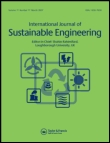
International Journal of Sustainable Engineering
Elevating the dialogue on sustainable engineering advancements.Welcome to the International Journal of Sustainable Engineering, an esteemed publication within the field of engineering, dedicated to advancing the principles of sustainability in design and technology. Published by Taylor & Francis Ltd, this Open Access journal, available since 2022, provides a platform for high-quality research that addresses the challenges of sustainable engineering across diverse sectors. Based in the United Kingdom, the journal enjoys a distinguished reputation, reflected in its impressive Q1 status in the Engineering (miscellaneous) category and a notable Scopus rank of #35 out of 307, placing it in the top 88th percentile of its field. With a timeline of publications from 2008 to 2024, the International Journal of Sustainable Engineering serves as a vital resource for researchers, professionals, and students seeking to engage with innovative solutions that promote sustainability in engineering practices. We invite you to contribute to this critical discourse and explore the wealth of knowledge presented in our journal.
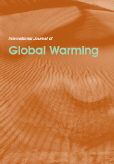
International Journal of Global Warming
Shaping Environmental Policy through Scholarly InsightWelcome to the International Journal of Global Warming, a pioneering publication dedicated to advancing knowledge in the crucial fields of global warming, climate change, and environmental policy. Published by INDERSCIENCE ENTERPRISES LTD, this journal serves as an essential platform for interdisciplinary research, examining the multifaceted impacts of global temperature rises on our planet. Since its inception in 2009 and continuing through to 2024, the journal has fostered a vibrant scholarly community, despite currently being indexed in the Q4 quartile for Atmospheric Science and Global and Planetary Change. The journal's unique focus allows researchers, professionals, and students to engage with critical data and innovative methodologies in environmental management, monitoring, and legal policy responses. Submissions are invited from scholars worldwide, though the journal is not open access, ensuring a selective and quality-driven publication process. Beyond its academic contributions, the International Journal of Global Warming plays a significant role in shaping discussions about climate resilience and sustainability practices, making it a vital resource in today's pressing environmental discourse.
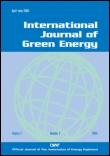
International Journal of Green Energy
Transforming research into impactful green practices.The International Journal of Green Energy is a premier publication that plays a pivotal role in the field of renewable energy and sustainability. Published by Taylor & Francis Inc, this journal, with ISSN 1543-5075 and E-ISSN 1543-5083, has established itself as a crucial platform for sharing innovative research and developments from 2005 to 2024. With a commendable Q2 ranking in the category of Renewable Energy, Sustainability and the Environment, it ranks 100 out of 270 in Scopus, positioning itself in the 63rd percentile of its field. The journal is dedicated to advancing knowledge and fostering dialogue around green technologies and sustainable practices, providing invaluable insights for researchers, industry professionals, and students alike. Although it does not offer open access options, the journal's commitment to rigorous peer review ensures that only high-quality research is published, making it an essential resource for those seeking to explore and understand the complexities of green energy solutions.
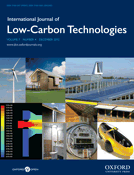
International Journal of Low-Carbon Technologies
Transforming research into impactful environmental action.International Journal of Low-Carbon Technologies is a premier, peer-reviewed publication dedicated to advancing the field of low-carbon technologies and sustainable practices. Published by OXFORD UNIVERSITY PRESS, this journal serves as a vital resource for researchers, professionals, and students alike, providing insightful research and innovative solutions for a sustainable future. With its ISSN 1748-1317 and E-ISSN 1748-1325, the journal is recognized globally, boasting an impressive impact in its categories, including a Q1 ranking in Architecture and Q2 rankings in both Civil and Structural Engineering and Environmental Science as of 2023. It is open access since 2014, facilitating the dissemination of knowledge to a wider audience, and encourages critical discourse on environmental sustainability across converging disciplines. The journal’s Scopus rankings reflecting its standing—ranked #23 in Architecture (88th percentile) and #130 in Civil and Structural Engineering—underscore its importance in driving forward the scientific agenda in low-carbon technologies. As we journey from 2007 towards 2024, the International Journal of Low-Carbon Technologies remains a cornerstone for research and dialogue in reducing carbon footprints and promoting resilient infrastructure.
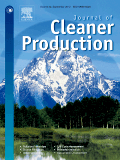
Journal of Cleaner Production
Exploring Interdisciplinary Approaches to Cleaner ProductionThe Journal of Cleaner Production, published by Elsevier Science Ltd, is a leading interdisciplinary journal dedicated to the development and dissemination of knowledge on environmental sustainability and cleaner production practices. With an impact factor that reflects its high relevance in the field, the journal is recognized as a Q1 publication in key categories including Environmental Science, Industrial and Manufacturing Engineering, Renewable Energy, and Strategy and Management as of 2023. This prestigious journal has been a platform for groundbreaking research since its inception in 1993 and continues to shape the dialogue around sustainable practices in various sectors. Researchers and professionals across disciplines can access its wealth of insights, which are critical for driving the transition towards more sustainable production and consumption models. The journal’s rigorous peer-review process ensures that only high-quality research is published, making it an essential resource for academics, industry leaders, and policymakers committed to advancing cleaner production methodologies.
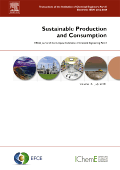
Sustainable Production and Consumption
Leading the Charge in Sustainable Manufacturing and ConsumptionWelcome to Sustainable Production and Consumption, a premier journal published by Elsevier in the vibrant field of sustainability and environmental science. With an ISSN of 2352-5509, this journal has established itself as a leading platform for innovative research and discourse on sustainable manufacturing, consumption practices, and environmental technologies. As evidenced by its impressive 2023 rankings—Q1 in Environmental Chemistry, Environmental Engineering, Industrial and Manufacturing Engineering, and Renewable Energy, Sustainability and the Environment—the journal ranks among the top tier of its field. Researchers and professionals alike are invited to explore the journal’s rigorous peer-reviewed articles, which aim to advance the understanding and implementation of sustainable practices across various industries. With a strong commitment to disseminating impactful research, Sustainable Production and Consumption serves as an essential resource for academics, policy makers, and industry leaders seeking to address the challenges of modern environmental sustainability.
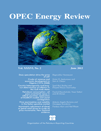
OPEC Energy Review
Unraveling the Complexities of Energy and Market DynamicsOPEC Energy Review, published by Wiley, is a leading journal dedicated to advancing knowledge in the fields of economics and energy studies. With its ISSN 1753-0229 and E-ISSN 1753-0237, this journal serves as a vital resource for researchers, professionals, and students interested in the dynamic interplay between energy policies, market trends, and economic frameworks. Positioned in the Q3 tier for both Economics and Econometrics and Energy (miscellaneous) categories as of 2023, the journal highlights its commitment to addressing contemporary issues in energy economics. The OPEC Energy Review aims to foster scholarly dialogue through rigorous peer-reviewed articles and comprehensive analyses, contributing to the understanding of global energy markets and their economic implications. For anyone looking to delve deeper into energy economics, this journal stands as a key platform for innovative research, fostering a well-rounded view of current challenges and opportunities in the sector.

Nafta-Gaz
Advancing Energy Solutions for a Sustainable FutureNafta-Gaz is a leading academic journal published by the Institute of Oil and Gas, dedicated to advancing the fields of energy engineering, environmental engineering, fuel technology, and geosciences. With a strong emphasis on both theoretical and applied research, this journal serves as a critical resource for professionals, researchers, and students looking to deepen their understanding of contemporary challenges in oil, gas, and renewable energy sectors. Though currently categorized in the Q4 quartile across several relevant disciplines, including Energy Engineering and Geophysics, Nafta-Gaz is committed to fostering innovative discussions and pragmatic solutions that pertain to energy management, environmental policy, and technological advancements. Published in Poland, Nafta-Gaz is positioned amid the rapidly evolving energy landscape, providing a platform for the exchange of knowledge and best practices. The journal does not currently operate under an open access model, ensuring that content is curated for a specialized audience while maintaining the integrity of scholarly communication.

Clean Technologies
Leading the Charge in Clean Technology ResearchClean Technologies, published by MDPI in Switzerland, is a pioneering open-access journal that has garnered significant recognition since its inception. Focusing on innovative solutions and practices for sustainability, it aims to serve the interdisciplinary field of clean technology while addressing pressing environmental challenges. With an impressive impact factor evidenced by its Q2 ranking in Environmental Science (miscellaneous) and Q3 in Global and Planetary Change, as well as a Scopus rank of #43 among a competitive pool of journals in these fields, Clean Technologies is positioned as a vital resource for researchers, professionals, and students alike. As a forward-thinking platform with open access since 2018, the journal emphasizes the dissemination of high-quality research, fostering collaboration and innovation in the quest for sustainable development. Located at ST ALBAN-ANLAGE 66, CH-4052 BASEL, SWITZERLAND, it also provides a comprehensive digital archive that allows for easy access to cutting-edge studies and findings relevant to global sustainability efforts.
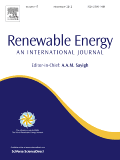
Renewable Energy
Exploring Breakthroughs in Clean Energy.Renewable Energy is a prestigious international journal published by PERGAMON-ELSEVIER SCIENCE LTD, dedicated to advancing the field of renewable energy technologies and their applications. Since its inception in 1991, this journal has provided a critical platform for researchers, professionals, and students to explore innovative solutions in renewable energy, sustainability, and environmental protection. With an impressive impact factor and ranked in the top quartile (Q1) of its category, Renewable Energy is recognized for its high-quality, peer-reviewed research that significantly contributes to the scientific and professional discourse in the sector. The journal is indexed in Scopus, holding an esteemed rank of #21 out of 270 in its field, underscoring its influence and reach. Researchers can access the journal’s articles through traditional subscriptions, ensuring a broad dissemination of vital knowledge that supports the global transition to sustainable energy sources. Addressed from its headquarters in Oxford, England, Renewable Energy is crucial for anyone involved in the journey towards a sustainable future, fostering collaboration and innovation in a critical area of environmental science.